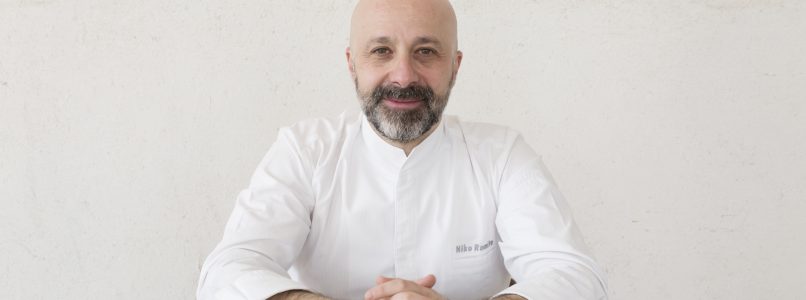The Abruzzo chef launches a permanent laboratory for chefs in Castel di Sangro, ready in 2022 and based on research, training and industrialization. With a North Star: "Everything must go in the direction of good and healthy food"
Niko Romito has a magnificent obsession with teaching. Perhaps because practically self-taught he has become one of the best Italian chefs (and not only) who in 15 years has gone from first courses in the family restaurant to Three Michelin Stars. Knowing how important the technical and cultural preparation of a future cook is, he opened in 2011 in Casadonna – the renovated ex-convent of Castel di Sangro where he leads the Real – its Academy, considered one of the best schools ever. "My reference was what was created byParisian École by Alain Ducasse: I understood that the method that allowed to conduct gastronomic formats, with great qualitative consistency, all started from the training center. An idea that I tried to apply to the model of Italian tradition and my philosophy, "explains the master from Abruzzo.
Chef and mentor
Sixteen students per course, thirty-two students a year, which generates "human capital" for the group's restaurants and projects, and at the same time spreads an approach to building one's own culinary language. After six months of immersive training – followed by top-level teachers – we start for a six-month internship, in one of the satellites of the Romito network: the three-starred Reale, which is a few meters from the Academy, the various Spaces, the restaurants of the Bulgari Hotels in Milan, Beijing, Shanghai and Dubai, the Alt taste station, the Bomba street food format and the Intelligenza Nutritional project partnership with La Sapienza University and the hospital menu production chain. It is no coincidence that the Michelin Chef Mentor Award 2021 went to him, in the month – November – in which Romito was director of the magazine “La Cucina Italiana”.
2022 target
Now a big leap in quality. A structure of 3700 square meters on Strada Statale 17 – also in Castel di Sangro – which will host the Niko Romito Campus. It will be a research and advanced training center that will weave interdisciplinary dialogues around food and innovation, with the possibility of translating ideas into formats suitable for each segment. A gymnasium of experimentation on the concepts of goodness and healthiness with potential repercussions on every category of catering. The campus will arise from a renovation project of a furniture factory. There will be research laboratories, classrooms, a production center for virtual teaching materials, common areas and an open space dedicated to agronomic experiments. Theory and practice will travel together: the outcome of the progress and activities on campus will also be shared with everyone through a virtual platform which will give an account of the path taken in Castel di Sangro. "The works will begin in a few months, we aim to open enrollments in spring 2022", he explains, "to hold the first courses in the following autumn". Romito elaborated the project during the many weeks of closure of his activities and obtained clear visions from it.
The social value
“One of my missions of the future is to make people understand the importance of food and the consequences it has on healthHe says. «In 2020 we have both aspects better in focus. So it is essential to make it clear that eating well and healthy can improve health. In addition to reducing public expenditure, because malnutrition generates 40% of diseases and therefore the expenditure of enormous resources to treat them. A serious cook cannot avoid being involved in these issues . For Niko, it must be said, these are nothing new: many projects – starting with Nutritional Intelligence conducted with the Cristo Re hospital in Rome – they helped him in the creation of the Campus. «In recent years I have understood the social value of food. And how crucial industrialization must be in food transformation processes to improve the catering of hospitals, canteens, companies and schools. The commitment must be that of convey good and healthy products through simple or more complex catering models, as long as they benefit the largest number of people possible .
Format incubator
Ultimately, what is the purpose of the Campus? "Sharing knowledge and developing culture at various levels, above all a new culture of food, of its transformation based on the values of healthiness, sustainability, circularity, solidarity and democratic access. Always with the same scientific and technical approach: a single standardizable, accessible, open application protocol. Research is certainly the starting point of this path, whose immediate next step is training. But the purpose of this track is to become the incubator of new formats, necessary so that everything is not limited to theory, but you find a concrete outlet in entrepreneurship linked to nutrition and catering. It is a long and ambitious job, I realize that. But it is the only way I know ".
